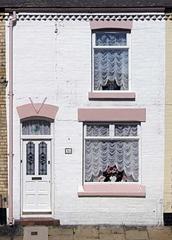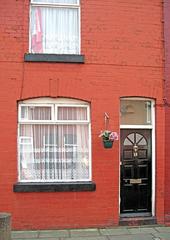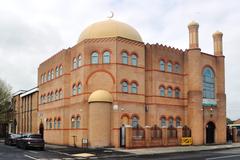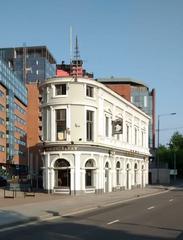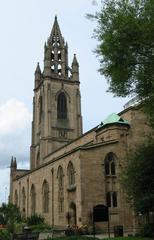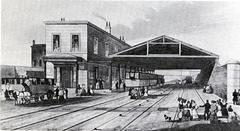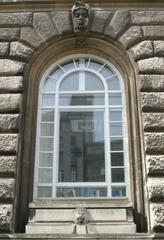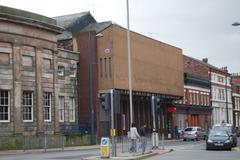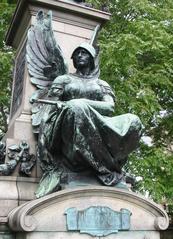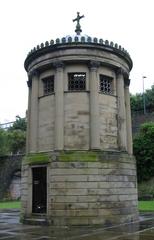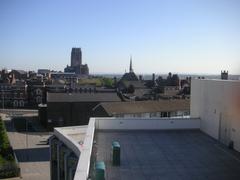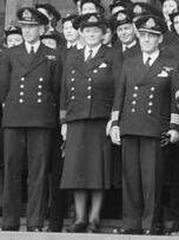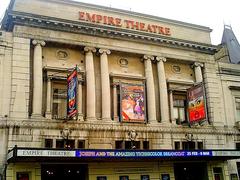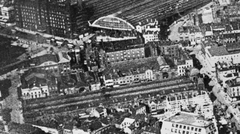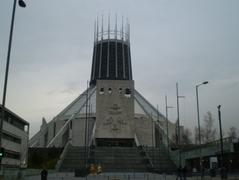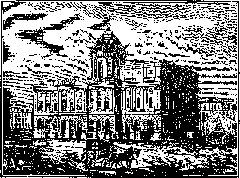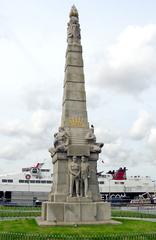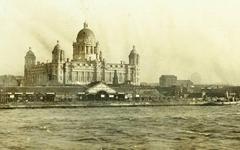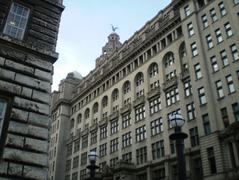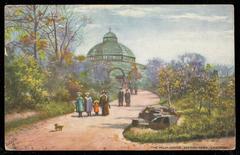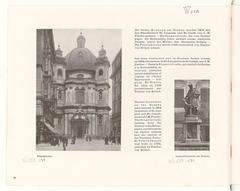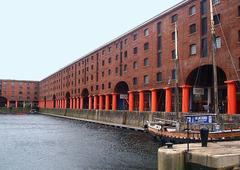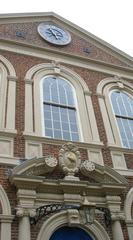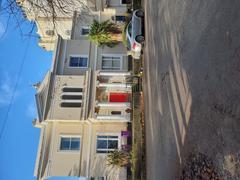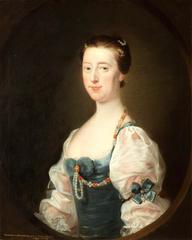
Visiting the United States Consulate in Liverpool, United Kingdom: Tickets, Hours, and Visitor Information
Date: 04/07/2025
Introduction: History and Significance of the U.S. Consulate in Liverpool
The United States Consulate in Liverpool holds a special place in the chronicles of American diplomacy, recognized as the very first U.S. consulate established overseas in 1790. During Liverpool’s era as one of the world’s busiest ports, the consulate was instrumental in safeguarding American maritime and commercial interests and fostering transatlantic trade. Beyond mediating disputes and assisting U.S. citizens abroad, the consulate played a pivotal role during significant historical events such as the War of 1812 and the American Civil War, with figures like Nathaniel Hawthorne and Thomas Haines Dudley contributing to its enduring legacy. While the original consulate in the Cunard Building is no longer operational and is generally closed to the public, its impact lives on through local museums, heritage trails, and archival collections that highlight its historical importance. This guide offers a comprehensive overview of the consulate’s history, significance, and practical visitor information for those seeking to explore Liverpool’s rich maritime and diplomatic heritage (dbpedia.org; history.state.gov; uk.usembassy.gov).
Contents
- Introduction
- Establishment of the U.S. Consulate in Liverpool
- Liverpool’s Role in Transatlantic Relations
- Notable Consuls and Historical Figures
- The Consulate During Major Historical Events
- The War of 1812
- The American Civil War
- Postwar Decline and Closure
- Visiting the U.S. Consulate Liverpool Historical Site and Nearby Attractions
- Preservation and Commemoration
- Practical Visitor Information
- Location and Current Status
- Nearest U.S. Consular Services
- Nearby Attractions
- Visitor Tips
- Cultural and Historical Insights
- Frequently Asked Questions (FAQ)
- Summary and Final Tips
- Sources and Official Links
Establishment of the U.S. Consulate in Liverpool
Established in 1790, the U.S. Consulate in Liverpool was the first American consulate abroad (dbpedia.org). Liverpool’s status as a key port for global trade made it an obvious choice for this pioneering consular post. The consulate’s creation enabled the United States to foster commercial relationships, protect its merchants, and provide support to American citizens in the United Kingdom (history.state.gov).
Liverpool’s Role in Transatlantic Relations
Throughout the late 18th and 19th centuries, Liverpool served as a vital maritime link between Britain and America. The consulate worked to streamline trade operations, offer legal assistance, and resolve disputes for American merchants, particularly in commodities like cotton and tobacco (dbpedia.org). It also played a crucial part in safeguarding sailors and intervening in maritime incidents, with detailed records preserved in national archives (nationalarchives.gov.uk).
Notable Consuls and Historical Figures
Several influential individuals served at the Liverpool consulate:
- Nathaniel Hawthorne (1853–1857): The celebrated American author who chronicled British society during his tenure, later publishing “Our Old Home.”
- Thomas Haines Dudley: Served during the American Civil War, combating Confederate operations in Britain, notably the launch of the CSS Alabama.
- John S. Service: Began his diplomatic career in Liverpool before becoming instrumental in U.S.-China relations.
The Consulate During Major Historical Events
The War of 1812
The outbreak of the War of 1812 disrupted diplomatic activities, leading to the temporary closure of the American legation in London and likely affecting operations in Liverpool (history.state.gov).
The American Civil War
During the Civil War, Liverpool became a center for Confederate agents. The consulate, under Thomas Haines Dudley, worked to counter Confederate shipbuilding efforts, illustrating the complexities of international diplomacy at the time (dbpedia.org).
Postwar Decline and Closure
After World War II, Liverpool’s decline as an international port reduced the consulate’s relevance, leading to its closure in 1975 (dbpedia.org). U.S. diplomatic missions in the UK are now based in London, Edinburgh, and Belfast (uk.usembassy.gov).
Visiting the U.S. Consulate Liverpool Historical Site and Nearby Attractions
While the original consulate in the Cunard Building is closed to the public, Liverpool’s maritime legacy is celebrated at nearby museums and through heritage trails. Highlights include:
- Merseyside Maritime Museum: Showcasing Liverpool’s shipping history and transatlantic trade.
- International Slavery Museum: Providing context on Liverpool’s role in maritime history.
- The Albert Dock: A UNESCO World Heritage site with museums, restaurants, and galleries.
- Liverpool Town Hall: Home to a portrait of James Maury, the first U.S. consul in Liverpool.
Guided walking tours and national archives offer further opportunities to explore the consulate’s historical context (nationalarchives.gov.uk).
Preservation and Commemoration
Although there are no dedicated exhibitions for the former consulate, its legacy is preserved through local scholarship, educational programs, and historical trails. The story of the U.S. Consulate is integrated into Liverpool’s broader maritime and cultural narrative.
Practical Visitor Information
Location and Current Status
- Former Address: Cunard Building, Water Street, Liverpool L3 1DS
- Status: The consulate is no longer operational and closed to visitors. The Cunard Building may be accessible during special heritage events.
Nearest U.S. Consular Services
All consular matters are handled by:
- U.S. Embassy London: U.S. Embassy London
- U.S. Consulate General Edinburgh: U.S. Consulate Edinburgh
- U.S. Consulate General Belfast: U.S. Consulate Belfast
Visitor Tips
- Transport: Liverpool’s waterfront is easily accessed by public transport, with convenient connections via Merseyrail and local buses.
- Accessibility: Most museums and attractions are accessible for visitors with mobility needs.
- Weather: July is generally mild; pack layers and a rain jacket.
- Safety: Liverpool is considered safe for tourists; standard precautions apply.
Visa and Entry Requirements
- For U.S. Citizens Visiting the UK: Starting January 8, 2025, an Electronic Travel Authorization (ETA) is required. Apply via the UK Government ETA website.
- For UK Citizens Visiting the U.S.: UK passport holders must obtain an ESTA under the Visa Waiver Program.
Applying for U.S. Visas in the UK
Applications are processed in London, Edinburgh, or Belfast. Refer to the U.S. Embassy visa page for up-to-date requirements and processing times.
Cultural and Historical Insights
The U.S. consulate in Liverpool was integral in shaping transatlantic relations, particularly during the 19th century. Its history highlights Liverpool’s significance as a commercial and diplomatic center, with lasting impact on both British and American heritage.
Frequently Asked Questions (FAQ)
Q: Can I visit the former U.S. consulate building in Liverpool?
A: No, the building is not open to the public as a consulate. Access may be possible during special events or heritage tours.
Q: Are there any active U.S. consular services in Liverpool?
A: No, consular services are provided at the U.S. Embassy in London and consulates in Edinburgh and Belfast.
Q: Where can I learn more about the consulate’s history?
A: Liverpool’s museums, heritage tours, and the Town Hall (which has a portrait of James Maury) offer information. National archives and online resources provide additional details.
Q: How do I apply for a U.S. visa while in Liverpool?
A: Visa applications must be processed at the U.S. Embassy in London or the consulates in Edinburgh or Belfast.
Summary and Final Tips
The U.S. Consulate in Liverpool stands as a monument to early American diplomacy and the city’s global maritime legacy. Although the consulate has been closed for decades, visitors can still appreciate its historical significance by exploring the Cunard Building’s exterior, Liverpool’s maritime museums, and heritage trails that shed light on U.S.-UK relations. For current consular services, contact the U.S. Embassy in London or the consulates in Edinburgh or Belfast. To enhance your visit, use resources like the Audiala app and official embassy websites, and always check travel requirements before planning your trip (dbpedia.org; uk.usembassy.gov; ADST).
Sources and Official Links
- Consulate of the United States, Liverpool (dbpedia.org)
- United Kingdom – U.S. Department of State (history.state.gov)
- U.S. Embassy & Consulates in the United Kingdom (uk.usembassy.gov)
- A Brief History of the Consular Service (ADST)
- List of diplomatic missions of the United States (Wikipedia)

